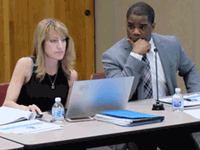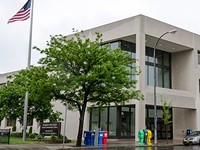[
{
"name": "500x250 Ad",
"insertPoint": "5",
"component": "15667920",
"parentWrapperClass": "",
"requiredCountToDisplay": "1"
}
]
Every year about this time, ACT Rochester releases what it calls a Community Report Card: a look at the overall health of the nine-county Greater Rochester region.
Using data compiled by the Center for Governmental Research, ACT looks at everything from support for the arts to unemployment rates and residents’ actual physical health. And comparing the newest data to those of past years, ACT gives us a sense of how we’re doing, whether things are getting better or worse.
The purpose is not only to share information but also to encourage us to act – in ways that will be successful.
This community doesn’t have a good track record in that area. We brag about how much we give to the United Way, how civic-minded we are. Show us a problem, and a task force will be studying it in the bat of an eye. But we’re long on talk and enthusiasm, short on successful action.
Thus the potential of ACT – a program of the Rochester Area Community Foundation – and its Report Card. If the community has the facts, and looks at where we’re making progress and where we’re not, we at least have the basis for sound action.
So what does the latest ACT Report Card tell us?
There’s certainly some good news in it. Attendance at arts and cultural attractions – in everything from museums, theaters, and dance performances to festivals – has been increasing.
Voter participation is higher than the state average. So is our library usage.
Mortality rates from stroke, heart disease, and cancer are down. The infant mortality rate is down. Only 7 percent of the region’s residents lack health insurance, a rate that’s lower even than the state’s low rate.
But the Report Card’s bad news is very bad. And it’s the same very bad news found in previous reports. The region’s childhood poverty rate, 21 percent, is slightly below the state average. But the rate in the City of Rochester is horrendous: 52 percent. And it’s especially high among African American and Hispanic children.
The region’s overall poverty rate – 14 percent – is up, but it’s less than the state and national rates. The city’s poverty rate, however, is 33 percent.
Seventy-three percent of families in the City of Rochester are headed by single parents – a condition we know is closely related to multi-generational poverty.
I asked Tom Argust, who chairs the ACT advisory committee, whether he found any surprises in the latest report. “I don’t think so,” he said. “It’s pretty much the same. We’re treading water.”
Treading water.
It’s important that ACT puts out these numbers every year, but, as Argust notes, “that’s not the whole story.”
“The story is what we do with this data,” he said. “Can we say that it’s pushing some kind of major change in this community?”
It’s not that we’re doing nothing. At an event unveiling the latest report on Friday, ACT celebrated some individual actions that are making a difference, thanks to data that highlighted particular needs: a major cooperative effort in Yates County, for instance, that is resulting in a food pantry and other help for the poor.
Those kinds of individual efforts are important. But we’re still waiting for major change. We have to lift the poor – the largest number of whom are concentrated in the City of Rochester – out of poverty.
The ACT report says the region’s median household income has declined 15 percent since 2000. But business leaders have opposed raising the minimum wage.
Our latest effort to reduce poverty, the two-year-old Rochester-Monroe Anti-Poverty Initiative, has been heavy on process, light on major, concrete action.
And nobody seems willing to address the key challenge: the concentration of our poverty.
We’ve had the evidence about our poverty for years. At some point, we have to summon the will to do what ACT’s name implies that we’ll do: Act.
Using data compiled by the Center for Governmental Research, ACT looks at everything from support for the arts to unemployment rates and residents’ actual physical health. And comparing the newest data to those of past years, ACT gives us a sense of how we’re doing, whether things are getting better or worse.
The purpose is not only to share information but also to encourage us to act – in ways that will be successful.
This community doesn’t have a good track record in that area. We brag about how much we give to the United Way, how civic-minded we are. Show us a problem, and a task force will be studying it in the bat of an eye. But we’re long on talk and enthusiasm, short on successful action.
Thus the potential of ACT – a program of the Rochester Area Community Foundation – and its Report Card. If the community has the facts, and looks at where we’re making progress and where we’re not, we at least have the basis for sound action.
So what does the latest ACT Report Card tell us?
There’s certainly some good news in it. Attendance at arts and cultural attractions – in everything from museums, theaters, and dance performances to festivals – has been increasing.
Voter participation is higher than the state average. So is our library usage.
Mortality rates from stroke, heart disease, and cancer are down. The infant mortality rate is down. Only 7 percent of the region’s residents lack health insurance, a rate that’s lower even than the state’s low rate.
But the Report Card’s bad news is very bad. And it’s the same very bad news found in previous reports. The region’s childhood poverty rate, 21 percent, is slightly below the state average. But the rate in the City of Rochester is horrendous: 52 percent. And it’s especially high among African American and Hispanic children.
The region’s overall poverty rate – 14 percent – is up, but it’s less than the state and national rates. The city’s poverty rate, however, is 33 percent.
Seventy-three percent of families in the City of Rochester are headed by single parents – a condition we know is closely related to multi-generational poverty.
I asked Tom Argust, who chairs the ACT advisory committee, whether he found any surprises in the latest report. “I don’t think so,” he said. “It’s pretty much the same. We’re treading water.”
Treading water.
It’s important that ACT puts out these numbers every year, but, as Argust notes, “that’s not the whole story.”
“The story is what we do with this data,” he said. “Can we say that it’s pushing some kind of major change in this community?”
It’s not that we’re doing nothing. At an event unveiling the latest report on Friday, ACT celebrated some individual actions that are making a difference, thanks to data that highlighted particular needs: a major cooperative effort in Yates County, for instance, that is resulting in a food pantry and other help for the poor.
Those kinds of individual efforts are important. But we’re still waiting for major change. We have to lift the poor – the largest number of whom are concentrated in the City of Rochester – out of poverty.
The ACT report says the region’s median household income has declined 15 percent since 2000. But business leaders have opposed raising the minimum wage.
Our latest effort to reduce poverty, the two-year-old Rochester-Monroe Anti-Poverty Initiative, has been heavy on process, light on major, concrete action.
And nobody seems willing to address the key challenge: the concentration of our poverty.
We’ve had the evidence about our poverty for years. At some point, we have to summon the will to do what ACT’s name implies that we’ll do: Act.
Speaking of...
-

Urban Action 5/16
May 16, 2018 -

Mayor Warren's goal for a poverty-stressed city
Jan 2, 2018 -

How to reduce poverty: Boost workers' wages
Aug 9, 2017 - More »
Latest in Urban Journal
More by Mary Anna Towler
-

Police reform: advocates on what should come next
Oct 22, 2019 -

Court clears the way for Police Accountability referendum
Oct 17, 2019 -

Dade outlines initial actions on district deficit
Oct 9, 2019 - More »






